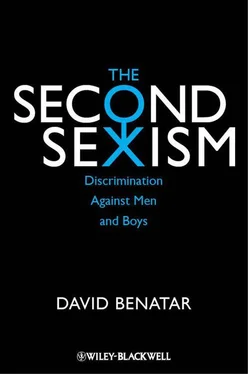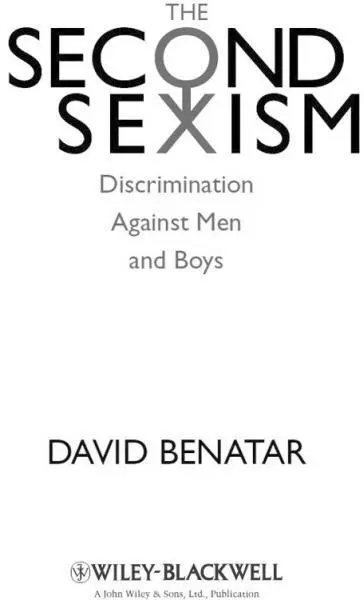David Benatar
THE SECOND SEXISM
Discrimination Against Men and Boys
Sexism negatively affects not only women and girls, but also men and boys. While the former manifestation of sexism is widely acknowledged, few people recognize or take seriously the fact that males are the primary victims of many and quite serious forms of sex discrimination. The central purpose of this book is to draw attention to this “second sexism” and to respond to those who would deny that it exists.
It is worth pre-empting the joke that a book about discrimination against males must be a very short book. Although this is a relatively short book, this is not because the scope or seriousness of the problem it discusses is limited. Instead it is (partly) because a longer book is not required to show that there is an extensive and dangerous second sexism.
That said, the book develops, at much greater length, the arguments I advanced in an earlier paper on this topic. The editors of Social Theory and Practice , to which I had submitted that paper, invited four responses. These were published alongside my original article as well as my rejoinder in the April 2003 (vol. 29, no. 2) issue of the journal. I am grateful to the editors of the journal for permission to draw on those earlier papers of mine in writing this book. I also acknowledge the use of material used in Chapter 6 that is drawn but significantly adapted from two other previous works of mine: “Diversity limited,” in Laurence Thomas (ed.), Contemporary Debates in Social Philosophy , Oxford: Blackwell, 2008, pp. 212–225; and “Justice, diversity and racial preference: a critique of affirmative action,” South African Law Journal , 125(2), 2008, pp. 274–306.
The first draft of this book was written while I was a Laurence S. Rockefeller Visiting Fellow at Princeton’s University Center for Human Values for the (northern hemisphere) 2009/2010 academic year. I want to thank the director, faculty and staff of the Center, both for awarding me this fellowship and for making my visit such an agreeable one. I could not have asked for a more stimulating environment in which to conduct my research and do my writing. The Princeton University libraries were also an invaluable resource and I appreciate the assistance provided by the library staff.
My thanks also go to the University of Cape Town for the period of sabbatical leave that enabled me to take up the fellowship and write the book.
Leo Boonzaier, Meghan Finn and Andrew Fisher provided very able research assistance. Jessica du Toit compiled the list of bibliographic references from my endnotes, and detected some typographical errors in the process. I am grateful to have had such excellent assistants.
I presented an overview of the book as the Morris Colloquium Speaker at the University of Colorado at Boulder. At a Laurence S. Rockefeller Fellows Seminar at the University Center for Human Values in Princeton, I presented parts of Chapter 5. In the Admiral Anderson Speaker Series at the United States Naval Academy, I presented the material on women and combat. I am grateful to those who attended these events for their comments.
Kingsley Browne kindly commented on my response (in Chapter 4) to his Co-Ed Combat . He and I still disagree on the question of women in combat, but his critical comments were most welcome. Nannerl Keohane provided helpful written comments on parts of Chapter 5.
I am especially grateful to Don Hubin and Iddo Landau, the two reviewers for Wiley-Blackwell, for their extensive and extremely helpful comments.
Finally, my thanks go to members of my family. The book is dedicated to my brothers.
DB Cape Town 20 June 2011
Many men are far more oppressed than many women, and any feminist who was determined to support women in all situations would certainly encounter some where her support of women against men would increase the level of injustice in the world….No feminist whose concern for women stems from concern for justice in general can ever legitimately allow her only interest to be the advantage of women.
Janet Radcliffe Richards,
The Sceptical Feminist , London: Penguin Books, 1994, p. 31.
What Is the Second Sexism?
In those societies in which sex discrimination has been recognized to be wrong, the response to this form of discrimination has targeted those attitudes and practices that (primarily) disadvantage women and girls. At the most, there has been only scant attention to those manifestations of sex discrimination whose primary victims are men and boys. 1 1 This is not to say that men have not sometimes utilized anti-discrimination legislation and sought relief from the courts for discrimination against them. However, anti-discrimination legislation was not enacted to target this form of discrimination. Moreover, there are those who seem to begrudge men this relief and make exaggerated claims about how much men have benefited. See, for example, Catharine A. MacKinnon, Feminism Unmodified , Cambridge, MA: Harvard University Press, 1987, p. 35.
What little recognition there has been of discrimination against males 2 2 Although men and boys are not the only males, when I use “males” in this book I am referring only to human males. Moreover, by “males” I mean those humans who are of the male sex rather than the male gender — that is to say, those who are anatomically rather than socially or psychologically male — in cases where sex and gender do not coincide. (For more on this, see note 7 below.)
has very rarely resulted in amelioration. For these reasons, we might refer to discrimination against males as the “second sexism,” to adapt Simone de Beauvoir’s famous phrase. 3 3 As far as I know this term is my own. In a response to my earlier article by this name, Tom Digby disputes this. He writes: “By the way, the epigraph to [Christina Hoff] Sommers’ article, ‘The War against Boys’ [ Atlantic Monthly , May 2000, pp. 59–74], presumably not written by the author, proclaims ‘it is boys who are the second sex’. So credit for that nasty inversion of Beauvoir’s expression may actually go to an anonymous editor at “ The Atlantic ” (Tom Digby, “Male trouble: are men victims of sexism?” Social Theory and Practice , 29(2), April 2003, p. 247, n. 3). Referring to boys as the second sex (which I encountered only after formulating my title) is an inversion or negation of the Beauvoirian phrase. My expression is a derivation from it. It says that even if females are the second sex, males are the victims of the second sexism. Professor Digby seems not to have distinguished between (a) a disagreement about whether boys or girls are the second sex, and (b) a claim that boys and men are the victims of a second sexism.
The second sexism is the neglected sexism, the sexism that is not taken seriously even by most of those who oppose (or at least claim that they oppose) sex discrimination. This is regrettable not only because of its implications for ongoing discrimination against males but also, as I shall argue later, because discrimination against females cannot fully be addressed without attending to all forms of sexism.
So unrecognized is the second sexism that the mere mention of it will appear laughable to some. Such people cannot even think of any ways in which males are disadvantaged, and yet some of them are surprised, when provided with examples, that they never thought of these before.
Читать дальше
Конец ознакомительного отрывка
Купить книгу













